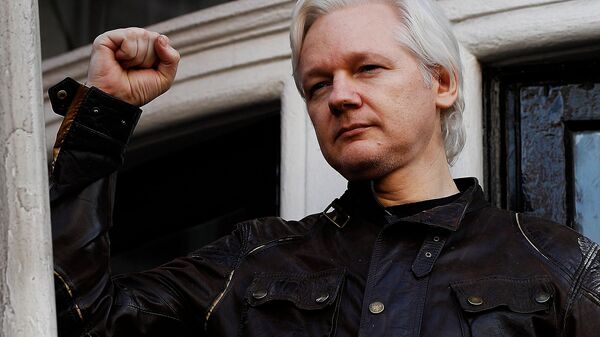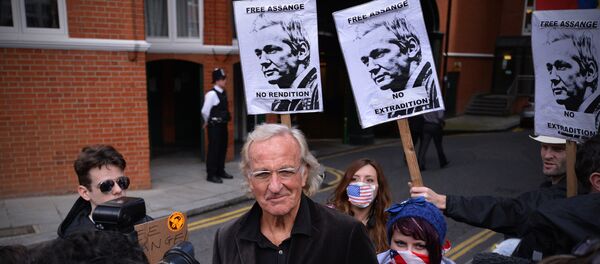Sputnik: Julian Assange has been cut off from communications for a month and a half. What is known about his physical condition?
Peter Tatchell: Julian Assange is a controversial figure and people often form to camps — love him or loathe him, but what has happened to him in the Ecuadorian Embassy is clearly a violation of his human right. He was granted political asylum by the government of Ecuador. They gave him refuge in the embassy, and the even granted him citizenship, yet he's now being denied the right that go with Ecuadorian citizenship, namely, the right to freedom of association and freedom of communication.
READ MORE: Ecuador Spends Some $5Mln to Protect WikiLeaks' Assange — Reports
He cannot access the phone, he cannot access the Internet, he is not allowed to have visitors, in effect, he's being held incommunicado. So he cannot contact the outside world and the outside world cannot contact him that is a very grave, gross human rights abuse. He has endured isolation in the embassy for six years and the psychological, emotional and physical toll has been very grave, especially given that he has not been charged with or convicted of any offense.
So his deprivations in the Ecuadorian Embassy are even worse than would be applied to a terrorist, a murderer, or rapist who's in a British prison, they would have more rights, more freedoms than Julian Assange has in the Ecuadorian Embassy.
Sputnik: Ecuador's foreign minister said that the country is in talks with Britain about the fate of Assange, do you have information, can you tell us about these talks, what do you know about it?
Peter Tatchell: Well, the trouble is that none of us know the content of those talks and these talks of been going on for months. It's not as of this some new development. Ever since the Swedish prosecutors decided to not proceed with any charges against Julian Assange, when he was effectively free of any legal implication or obligation to Sweden, immediately the Ecuadorians began discussions with the British government, now that is months, and months, and months ago.
Now the question is, what has motivated Ecuador to do this, this is out of the blue. So my fear is that there is some kind of leverage being exerted on Ecuador, either internally, but more likely, from perhaps, the British or American government, and sadly we don't know what that pressure is, but we can probably safely assume that there is some kind of pressure, and maybe that has pushed the Ecuadorians to intensify the restrictions on Assange.
Sputnik: Assange has had no access to medical care for six years, therefore, could this be qualified as some kind of torture?
Peter Tatchell: Julian is incredibly resilient, he's got to be, and he has proven to be by sticking it out for six years. I suspect he will carry on with his defiance, but eventually, there may come a point when it becomes so intolerable, in particular, if Ecuador escalates further restrictions on him.
The whole basis of his enforced detention in the Ecuadorian Embassy in London amounts to cruel, inhuman or degrading treatment which is a crime under the United Nations Convention Against Torture of 1984, that is clearly a criminal act.
READ MORE: Former Snowden Investigator Bullies Julian Assange's Mom on Twitter
If this was happening outside of the embassy in a prison, or a military prison or military encampment we would conclude that this amounted to a form of cruel, inhuman and degrading treatment, in other words, a form of torture. The Ecuadorians have a case to answer because their recent new restrictions on phone and email access, and visitors is ratcheting up that cruel, inhuman and degrading treatment.
Sputnik: If he's handed over to authorities will WikiLeaks continue, I'm sure it will continue, there's other leading players who are managing and running the organization, Assange is an iconic figure, usually when the iconic figure is removed the will of the company fails to have its energy, doesn't it?
Do you think it's going to be an adverse effect on WikiLeaks or is it going to strengthen the will to continue?
Peter Tatchell: If he's handed over to authorities and processed to the United States to face the grand jury he will carry on being the figurehead but under continued draconian restrictions. The organization WikiLeaks has survived all these years without him being a free man, so I'm fairly confident that it will continue.
The views and opinions expressed by the speaker do not necessarily reflect those of Sputnik.




